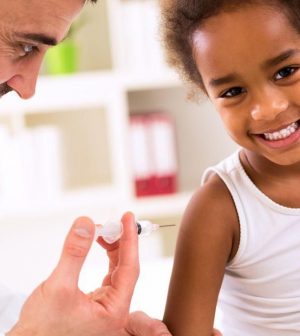- 10 Strategies to Overcome Insomnia
- Could Artificial Sweeteners Be Aging the Brain Faster?
- Techniques for Soothing Your Nervous System
- Does the Water in Your House Smell Funny? Here’s Why
- Can a Daily Dose of Apple Cider Vinegar Actually Aid Weight Loss?
- 6 Health Beverages That Can Actually Spike Your Blood Sugar
- Treatment Options for Social Anxiety Disorder
- Understanding the Connection Between Anxiety and Depression
- How Daily Prunes Can Influence Cholesterol and Inflammation
- When to Take B12 for Better Absorption and Energy
Wealthier Parents More Likely to Get COVID Vaccines for Young Kids: Poll

In a finding that suggests a family’s income influences parents’ views on COVID vaccines for their younger kids, a new survey shows the more money parents make, the likelier they are to get their kids a shot.
The poll of more than 2,000 parents found that 47% of those with annual incomes of $100,000 or more were willing to get their children ages 5-11 vaccinated, compared with just 37% of those with incomes between $75,000 and $99,000, and only 34% of those with incomes under $50,000, CNN reported.
“That trend line was absolutely clear from the lowest through the middle to the highest,” said Dr. William Schaffner, a vaccine adviser to the US Centers for Disease Control and Prevention who was not involved with the poll. He noted that people of higher income tend to have more education.
“With more education, you generally have more acceptance of science, and I think you’re more likely to participate in these sorts of public health and other preventive measures as recommended by the medical community,” Schaffner, an infectious disease specialist at Vanderbilt University Medical Center, told CNN.
Vaccinations for children ages 5-11 began last week. Roughly 900,000 children ages 5 through 11 have received a first dose of the Pfizer coronavirus vaccine by the end of Wednesday, White House officials said, and nearly 700,000 appointments have been made at pharmacies in the upcoming days.
The survey was conducted the week of Oct. 25 by a team of epidemiologists based at Boston Children’s Hospital and Harvard Medical School.
Lower income parents may also have a more difficult time getting their children vaccinated, according to researcher John Brownstein.
“You might need time off work to get an appointment, or time off potentially if your child has symptoms after the shot,” Brownstein told CNN. “Unfortunately, the disparities that have been seen across the pandemic, especially around income, will persist even around vaccine access and younger kids.”
Income-related findings such as this could help public health agencies target vaccine messages to specific groups, Schaffner told CNN.
More information
Visit the U.S. Centers for Disease Control and Prevention for more on kids and COVID vaccines.
Source: HealthDay
Copyright © 2026 HealthDay. All rights reserved.










